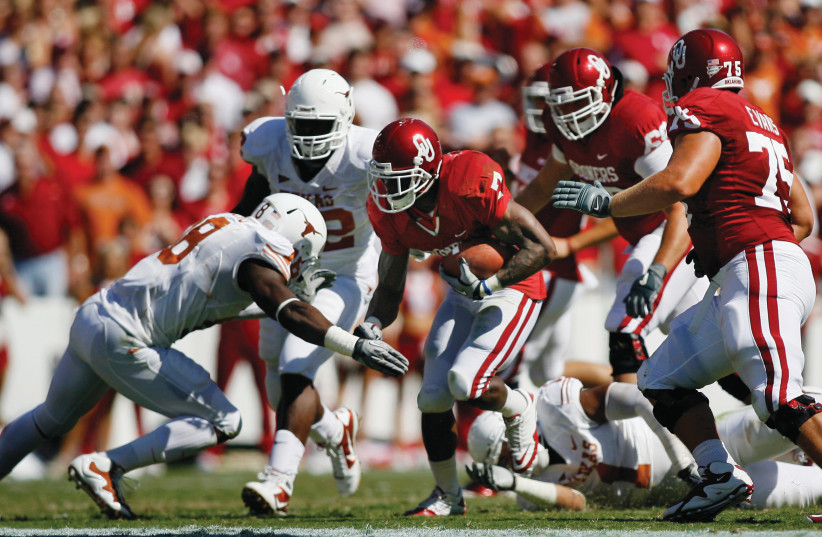‘Uncomfortable Conversations with a Jew’: Acho and Tishby address antisemitism, struggles
In the immediate aftermath of the Hamas attack on Israel, American football linebacker Emmanuel Acho asked Israeli actress and activist Noa Tishby to collaborate with him on a book about “antisemitism and misunderstandings of the Jewish struggle.” The result is Uncomfortable Conversations with a Jew.
The son of a Nigerian pastor, Acho is a former National Football League player, sports analyst, television personality, and host/producer of a YouTube series titled Uncomfortable Conversations with a Black Man – and author of a book of the same name.
Born in Tel Aviv, Tishby served in the IDF, moved to Los Angeles, and produced In Treatment for HBO, the first Israeli TV show to become a series in the United States. The author of Israel: A Simple Guide to the Most Misunderstood Country on Earth, she is Israel’s former special envoy for combating antisemitism and delegitimization.
In a format consisting of questions by Acho and detailed responses by Tishby, Uncomfortable Conversations covers a lot of ground. Some topics seem designed for readers who don’t know very much about Jewish history, religion, and culture, such as relationships between Jews and early Christians; varying levels of observance and adherence to Jewish law (Halacha) by Orthodox, Modern Orthodox, Conservative, and Reform Jews; persistent stereotypes about Jews; Jewish holidays; or Yiddish expressions.
Of course, Acho and Tishby also address the “hot button” issues: Are Jews in the United States and Europe white and yet still not white enough? Why is Zionism so controversial? Why have so many Blacks, who were so closely aligned with Jews at the height of the Civil Rights movement, now made common cause with Palestinians? Does antisemitism have a “new face”? How should we understand Oct. 7 and its aftermath?

Tishby’s analysis of these issues is informative and often compelling. Antisemitism, she emphasizes, involves branding Jews as inferior, while also “kinda looking up at them, mostly with fear or resentment, and attributing to them a larger-than-life power and control.” In a recent survey, about a quarter of recruiters and hiring managers in the United States wanted fewer Jews in their industry. Eleven percent of Millennial and Gen Z Americans believe Jews caused the Holocaust. After October 7, 2023, antisemitic incidents increased by 388% in the United States.
Tishby also documents the double standard applied to Israel. Although Islam is the official state religion in 23 countries, she points out, Israel is singled out for criticism as a Jewish state. Between 2006 and 2023, moreover, the United Nations’ Human Rights Council issued 16 resolutions condemning North Korea, 14 directed at Iran, none against China, and 103 against Israel.
That said, the conversations between Acho and Tishby are not always as uncomfortable as they could – and should – be. To be sure, Acho does push back on some of her claims, but he doesn’t provide evidence to support his point of view. Acho doesn’t press, for example, for a more precise definition of antisemitism or clarification of eligibility for a right of return. And he virtually always gives Tishby the last word.
Conversations on antisemitism
When “people intimate or say outright that Jews run anything,” like Hollywood or Wall Street, Tishby declares, “it snaps us back to antisemitic dog whistles.” And so, “it’s more accurate to say we hold positions of power.”
“This feels like semantics,” Acho replies. “If you hold a position of power, you have power.” Tishby then doubles down: “The jump from representation to control is where you start to dabble in stereotypes,” which have “negative, antisemitic overtones – or are outright antisemitic.” It’s as if “we see the same thing differently, and that’s okay,” Acho says, and moves to another topic.
When it comes to the Hamas massacre of innocent Israeli civilians, Tishby argues, “There is only wrong.” Acho agrees but not with her claim that “no context is required.” Acknowledging that “to some, there may not be two sides to the story,” he cites critics – “and I don’t rock with bad people” – who emphasize that Jews were colonizers and oppressors who forced Palestinians to leave their homes and their land. And these critics compare the treatment of Palestinians to what white colonists did to indigenous people in North and South America.
“That need to question” whether there is more to the story of Hamas terrorism “than it just being a tragedy,” Tishby retorts, is “to a T” the product of antisemitism. The analogy to American Indians, she insists, erases “the historically well-attested fact that the Land of Israel dates back to biblical times, that the Jewish people are indigenous to that land, and that they have a continued presence there.” And “it certainly erases the fact that Israel was there as an independent nation before anything else.”
Tishby also maintains that Israelis told the inhabitants of Gaza, “Here are the keys. Get your freedom, enjoy, create.” Israel left greenhouses, homes, and fields in Gaza, and Hamas burned them down.”
Acho does not contest these and other selective and contestable claims. He concludes Uncomfortable Conversations with a Jew by asking what “someone like me” can do to “support someone like you”; thanks Tishby for her courage; and wonders “How does this end?”
For these reasons, the book may leave some readers feeling that Acho and Tishby have fallen short of the goals they set for themselves and their readers, such as not spending “our precious energy trying not to offend one another rather than understanding why things are offensive” by opening our minds, educating ourselves, and “above all,” getting uncomfortable.
Glenn C. Altschuler is The Thomas and Dorothy Litwin Emeritus Professor of American Studies at Cornell University.
UNCOMFORTABLE CONVERSATIONS WITH A JEW
By Emmanuel Acho and Noa Tishby
Simon Element
320 pages; $27.99





Comments are closed.